
probe
AI-friendly semantic code search engine for large codebases. Combines ripgrep speed with tree-sitter AST parsing. Powers AI coding assistants with precise, context-aware code understanding.
Stars: 458
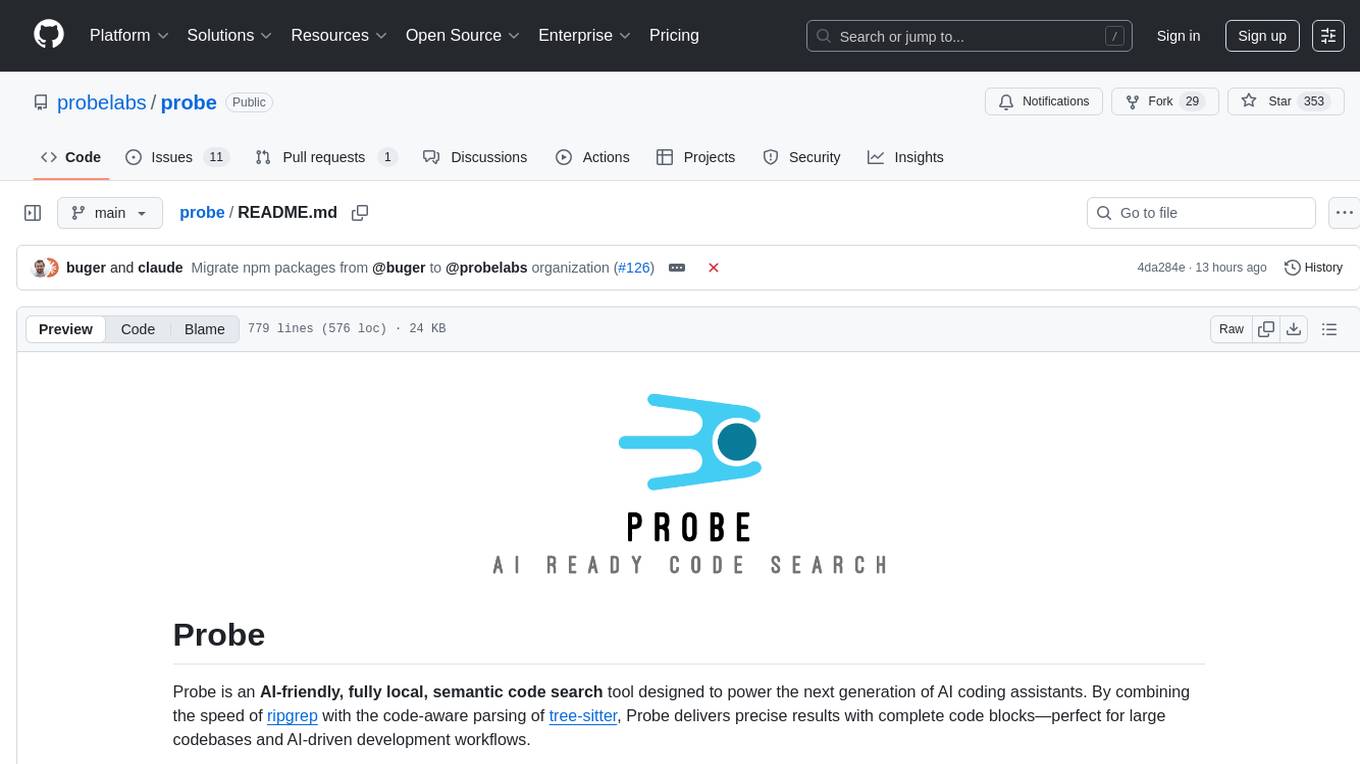
Probe is an AI-friendly, fully local, semantic code search tool designed to power the next generation of AI coding assistants. It combines the speed of ripgrep with the code-aware parsing of tree-sitter to deliver precise results with complete code blocks, making it perfect for large codebases and AI-driven development workflows. Probe supports various features like AI-friendly code extraction, fully local operation without external APIs, fast scanning of large codebases, accurate code structure parsing, re-rankers and NLP methods for better search results, multi-language support, interactive AI chat mode, and flexibility to run as a CLI tool, MCP server, or interactive AI chat.
README:
We read code 10x more than we write it. Probe is a code and markdown context engine, with a built-in agent, made to work on enterprise-scale codebases.
Today's AI coding tools use a caveman approach: grep some files, read random lines, hope for the best. It works on toy projects. It falls apart on real codebases.
Probe is a context engine built for reading and reasoning. It treats your code as code—not text. AST parsing understands structure. Semantic search finds what matters. You get complete, meaningful context in a single call.
The Probe Agent is purpose-built for code understanding. It knows how to wield the Probe engine expertly—searching, extracting, and reasoning across your entire codebase. Perfect for spec-driven development, code reviews, onboarding, and any task where understanding comes before writing.
One Probe call captures what takes other tools 10+ agentic loops—deeper, cleaner, and far less noise.
- Why Probe?
- Quick Start
- Features
- Usage Modes
- LLM Script
- Installation
- Supported Languages
- Documentation
- Environment Variables
- Contributing
- License
| Traditional Approach | Probe |
|---|---|
| Grep + read random lines | Semantic search with Elasticsearch syntax |
| Treats code as text | Understands code structure via tree-sitter AST |
| Returns fragments | Returns complete functions, classes, structs |
| Requires indexing | Zero setup, instant results |
| 10+ loops to gather context | One call, complete picture |
| Struggles at scale | Built for million-line codebases |
Our built-in agent natively integrates with Claude Code, using its authentication—no extra API keys needed.
Add to ~/.claude/claude_desktop_config.json:
{
"mcpServers": {
"probe": {
"command": "npx",
"args": ["-y", "@probelabs/probe@latest", "agent", "--mcp"]
}
}
}The Probe Agent is purpose-built to read and reason about code. It piggybacks on Claude Code's auth (or Codex auth), or works with any model via your own API key (e.g., GOOGLE_API_KEY).
If you prefer direct access to search/query/extract tools without the agent layer:
{
"mcpServers": {
"probe": {
"command": "npx",
"args": ["-y", "@probelabs/probe@latest", "mcp"]
}
}
}Use Probe directly from your terminal—no AI editor required:
# Semantic search with Elasticsearch syntax
npx -y @probelabs/probe search "authentication AND login" ./src
# Extract code block at line 42
npx -y @probelabs/probe extract src/main.rs:42
# AST pattern matching
npx -y @probelabs/probe query "fn $NAME($$$) -> Result<$RET>" --language rustAsk questions about any codebase directly from your terminal:
# One-shot question (works with any LLM provider)
npx -y @probelabs/probe@latest agent "How is authentication implemented?"
# With code editing capabilities
npx -y @probelabs/probe@latest agent "Refactor the login function" --allow-edit- Code-Aware: Tree-sitter AST parsing understands your code's actual structure
-
Semantic Search: Elasticsearch-style queries (
AND,OR,NOT, phrases, filters) - Complete Context: Returns entire functions, classes, or structs—not fragments
- One Call, Full Context: Captures what takes other tools 10+ loops to gather
- Zero Indexing: Instant results on any codebase, no setup required
- Fully Local: Your code never leaves your machine
- Blazing Fast: Ripgrep-powered scanning handles million-line codebases
- Smart Ranking: BM25, TF-IDF, and hybrid algorithms surface what matters
- Multi-Language: Rust, Python, JavaScript, TypeScript, Go, C/C++, Java, and more
The recommended way to use Probe with AI editors. The Probe Agent is a specialized coding assistant that reasons about your code—not just pattern matches.
{
"mcpServers": {
"probe": {
"command": "npx",
"args": ["-y", "@probelabs/probe@latest", "agent", "--mcp"]
}
}
}Why use the agent?
- Purpose-built to understand and reason about code
- Piggybacks on Claude Code / Codex authentication (or use your own API key)
- Smarter multi-step reasoning for complex questions
- Built-in code editing, task delegation, and more
Agent options:
| Option | Description |
|---|---|
--path <dir> |
Search directory (default: current) |
--provider <name> |
AI provider: anthropic, openai, google
|
--model <name> |
Override model name |
--prompt <type> |
Persona: code-explorer, engineer, code-review, architect
|
--allow-edit |
Enable code modification |
--enable-delegate |
Enable task delegation to subagents |
--enable-bash |
Enable bash command execution |
--max-iterations <n> |
Max tool iterations (default: 30) |
Direct access to Probe's search, query, and extract tools—without the agent layer. Use this when you want your AI editor to call Probe tools directly.
{
"mcpServers": {
"probe": {
"command": "npx",
"args": ["-y", "@probelabs/probe@latest", "mcp"]
}
}
}Available tools:
-
search- Semantic code search with Elasticsearch-style queries -
query- AST-based structural pattern matching -
extract- Extract code blocks by line number or symbol name
Run the Probe Agent directly from your terminal:
# One-shot question
npx -y @probelabs/probe@latest agent "How does the ranking algorithm work?"
# Specify search path
npx -y @probelabs/probe@latest agent "Find API endpoints" --path ./src
# Enable code editing
npx -y @probelabs/probe@latest agent "Add error handling to login()" --allow-edit
# Use custom persona
npx -y @probelabs/probe@latest agent "Review this code" --prompt code-reviewFor scripting and direct code analysis.
probe search <PATTERN> [PATH] [OPTIONS]Examples:
# Basic search
probe search "authentication" ./src
# Boolean operators (Elasticsearch syntax)
probe search "error AND handling" ./
probe search "login OR auth" ./src
probe search "database NOT sqlite" ./
# Search hints (file filters)
probe search "function AND ext:rs" ./ # Only .rs files
probe search "class AND file:src/**/*.py" ./ # Python files in src/
probe search "error AND dir:tests" ./ # Files in tests/
# Limit results for AI context windows
probe search "API" ./ --max-tokens 10000Key options:
| Option | Description |
|---|---|
--max-tokens <n> |
Limit total tokens returned |
--max-results <n> |
Limit number of results |
--reranker <algo> |
Ranking: bm25, tfidf, hybrid, hybrid2
|
--allow-tests |
Include test files |
--format <fmt> |
Output: markdown, json, xml
|
probe extract <FILES> [OPTIONS]Examples:
# Extract function at line 42
probe extract src/main.rs:42
# Extract by symbol name
probe extract src/main.rs#authenticate
# Extract line range
probe extract src/main.rs:10-50
# From compiler output
go test | probe extractprobe query <PATTERN> [PATH] [OPTIONS]Examples:
# Find all async functions in Rust
probe query "async fn $NAME($$$)" --language rust
# Find React components
probe query "function $NAME($$$) { return <$$$> }" --language javascript
# Find Python classes with specific method
probe query "class $CLASS: def __init__($$$)" --language pythonUse Probe programmatically in your applications.
import { ProbeAgent } from '@probelabs/probe/agent';
// Create agent
const agent = new ProbeAgent({
path: './src',
provider: 'anthropic'
});
await agent.initialize();
// Ask questions
const response = await agent.answer('How does authentication work?');
console.log(response);
// Get token usage
console.log(agent.getTokenUsage());Direct functions:
import { search, extract, query } from '@probelabs/probe';
// Semantic search
const results = await search({
query: 'authentication',
path: './src',
maxTokens: 10000
});
// Extract code
const code = await extract({
files: ['src/auth.ts:42'],
format: 'markdown'
});
// AST pattern query
const matches = await query({
pattern: 'async function $NAME($$$)',
path: './src',
language: 'typescript'
});Vercel AI SDK integration:
import { tools } from '@probelabs/probe';
const { searchTool, queryTool, extractTool } = tools;
// Use with Vercel AI SDK
const result = await generateText({
model: anthropic('claude-sonnet-4-5-20250929'),
tools: {
search: searchTool({ defaultPath: './src' }),
query: queryTool({ defaultPath: './src' }),
extract: extractTool({ defaultPath: './src' })
},
prompt: 'Find authentication code'
});Probe Agent can use the execute_plan tool to run deterministic, multi-step code analysis tasks. LLM Script is a sandboxed JavaScript DSL where the AI generates executable plans combining search, extraction, and LLM reasoning in a single pipeline.
// AI-generated LLM Script example (await is auto-injected, don't write it)
const files = search("authentication login")
const chunks = chunk(files)
const analysis = map(chunks, c => LLM("Summarize auth patterns", c))
return analysis.join("\n")Key features:
-
Agent integration - Probe Agent calls
execute_plantool to run scripts -
Auto-await - Async calls are automatically awaited (don't write
await) -
All tools available -
search(),query(),extract(),LLM(),map(),chunk(), plus any MCP tools - Sandboxed execution - Safe, isolated JavaScript environment with timeout protection
See the full LLM Script Documentation for syntax and examples.
npm install -g @probelabs/probecurl -fsSL https://raw.githubusercontent.com/probelabs/probe/main/install.sh | bashiwr -useb https://raw.githubusercontent.com/probelabs/probe/main/install.ps1 | iexgit clone https://github.com/probelabs/probe.git
cd probe
cargo build --release
cargo install --path .| Language | Extensions |
|---|---|
| Rust | .rs |
| JavaScript/JSX |
.js, .jsx
|
| TypeScript/TSX |
.ts, .tsx
|
| Python | .py |
| Go | .go |
| C/C++ |
.c, .h, .cpp, .cc, .hpp
|
| Java | .java |
| Ruby | .rb |
| PHP | .php |
| Swift | .swift |
| C# | .cs |
| Markdown | .md |
Full documentation available at probelabs.com/probe or browse locally in docs/.
- Quick Start - Get up and running in 5 minutes
- Installation - NPM, curl, Docker, and building from source
- Features Overview - Core capabilities
- Search Command - Elasticsearch-style semantic search
- Extract Command - Extract code blocks with full AST context
- Query Command - AST-based structural pattern matching
- CLI Reference - Complete command-line reference
- Agent Overview - What is Probe Agent and when to use it
- API Reference - ProbeAgent class documentation
- Node.js SDK - Full Node.js SDK reference
- MCP Integration - Editor integration guide
- LLM Script - Programmable orchestration DSL
- Query Patterns - Effective search strategies
- Architecture - System design and internals
- Environment Variables - All configuration options
- FAQ - Frequently asked questions
# AI Provider Keys
ANTHROPIC_API_KEY=sk-ant-...
OPENAI_API_KEY=sk-...
GOOGLE_API_KEY=...
# Provider Selection
FORCE_PROVIDER=anthropic
MODEL_NAME=claude-sonnet-4-5-20250929
# Custom Endpoints
ANTHROPIC_API_URL=https://your-proxy.com
OPENAI_API_URL=https://your-proxy.com
# Debug
DEBUG=1We welcome contributions! See our Contributing Guide.
For questions or support:
Apache 2.0 - See LICENSE for details.
For Tasks:
Click tags to check more tools for each tasksFor Jobs:
Alternative AI tools for probe
Similar Open Source Tools

probe
Probe is an AI-friendly, fully local, semantic code search tool designed to power the next generation of AI coding assistants. It combines the speed of ripgrep with the code-aware parsing of tree-sitter to deliver precise results with complete code blocks, making it perfect for large codebases and AI-driven development workflows. Probe supports various features like AI-friendly code extraction, fully local operation without external APIs, fast scanning of large codebases, accurate code structure parsing, re-rankers and NLP methods for better search results, multi-language support, interactive AI chat mode, and flexibility to run as a CLI tool, MCP server, or interactive AI chat.
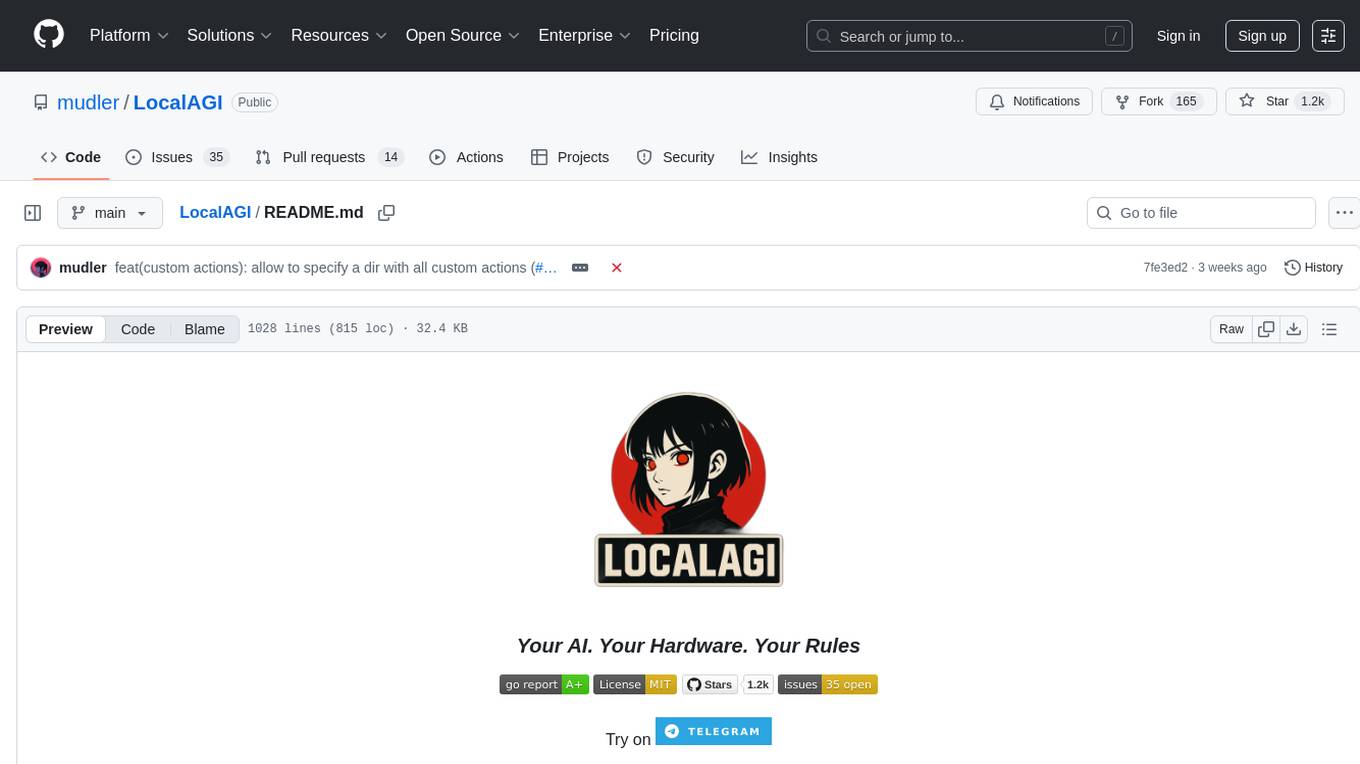
LocalAGI
LocalAGI is a powerful, self-hostable AI Agent platform that allows you to design AI automations without writing code. It provides a complete drop-in replacement for OpenAI's Responses APIs with advanced agentic capabilities. With LocalAGI, you can create customizable AI assistants, automations, chat bots, and agents that run 100% locally, without the need for cloud services or API keys. The platform offers features like no-code agents, web-based interface, advanced agent teaming, connectors for various platforms, comprehensive REST API, short & long-term memory capabilities, planning & reasoning, periodic tasks scheduling, memory management, multimodal support, extensible custom actions, fully customizable models, observability, and more.
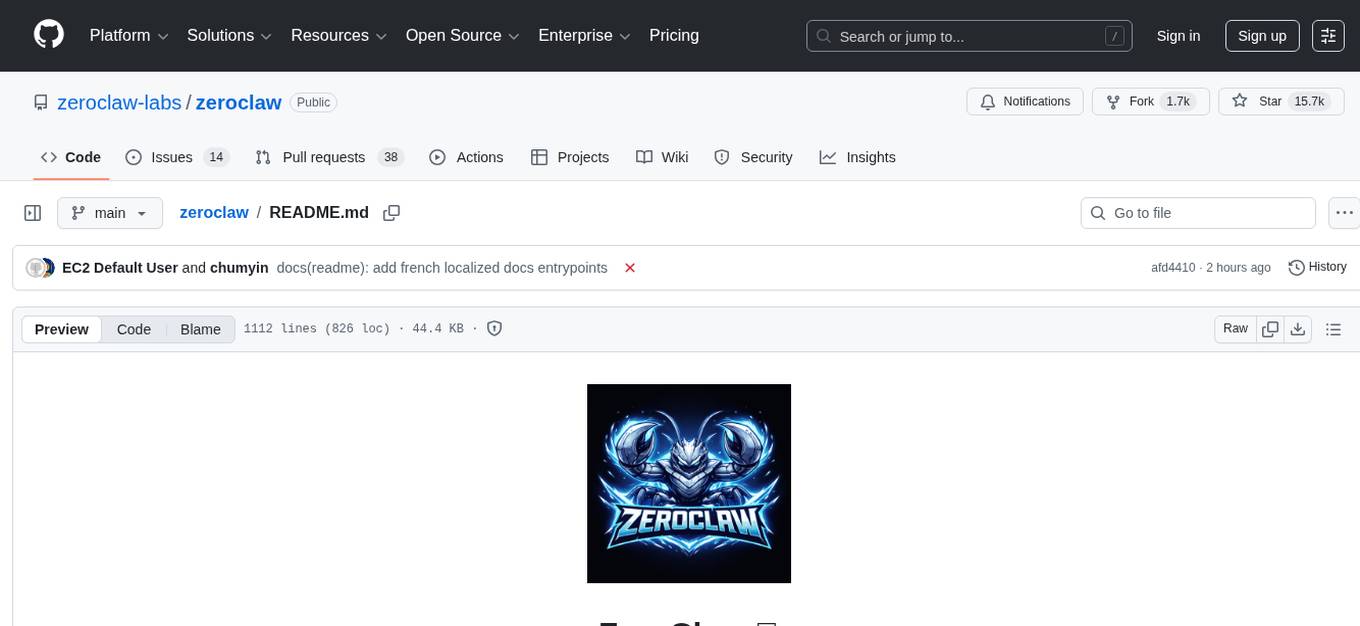
zeroclaw
ZeroClaw is a fast, small, and fully autonomous AI assistant infrastructure built with Rust. It features a lean runtime, cost-efficient deployment, fast cold starts, and a portable architecture. It is secure by design, fully swappable, and supports OpenAI-compatible provider support. The tool is designed for low-cost boards and small cloud instances, with a memory footprint of less than 5MB. It is suitable for tasks like deploying AI assistants, swapping providers/channels/tools, and pluggable everything.
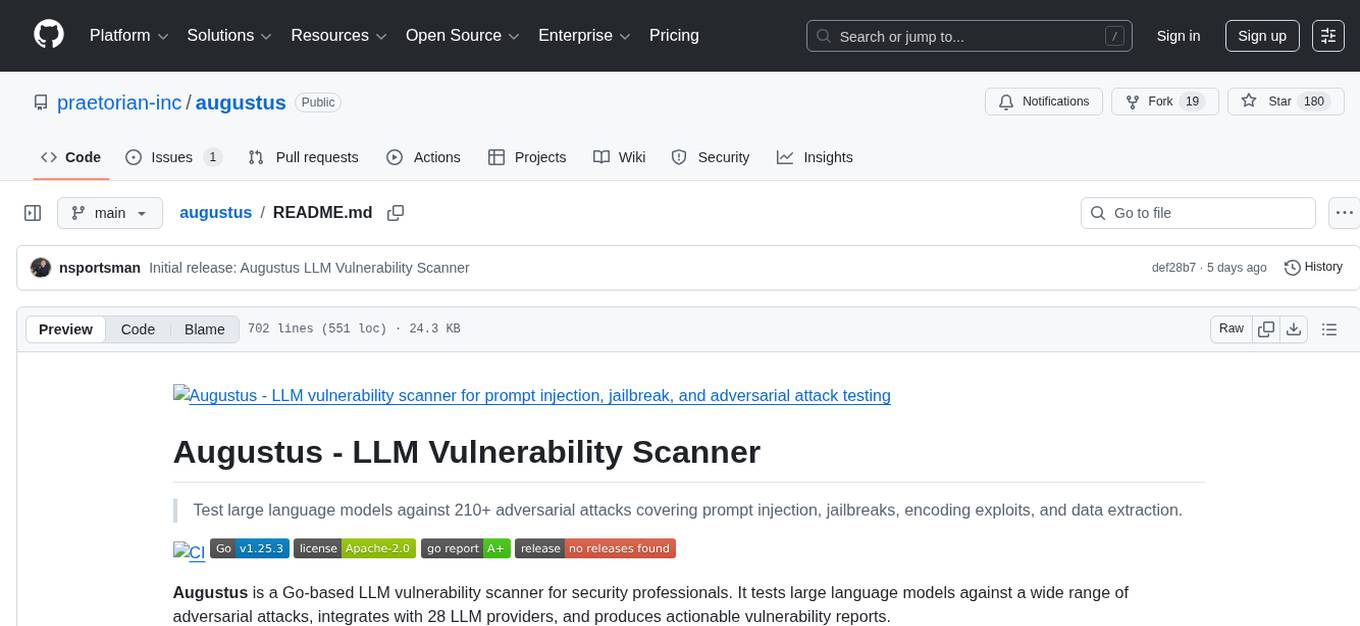
augustus
Augustus is a Go-based LLM vulnerability scanner designed for security professionals to test large language models against a wide range of adversarial attacks. It integrates with 28 LLM providers, covers 210+ adversarial attacks including prompt injection, jailbreaks, encoding exploits, and data extraction, and produces actionable vulnerability reports. The tool is built for production security testing with features like concurrent scanning, rate limiting, retry logic, and timeout handling out of the box.
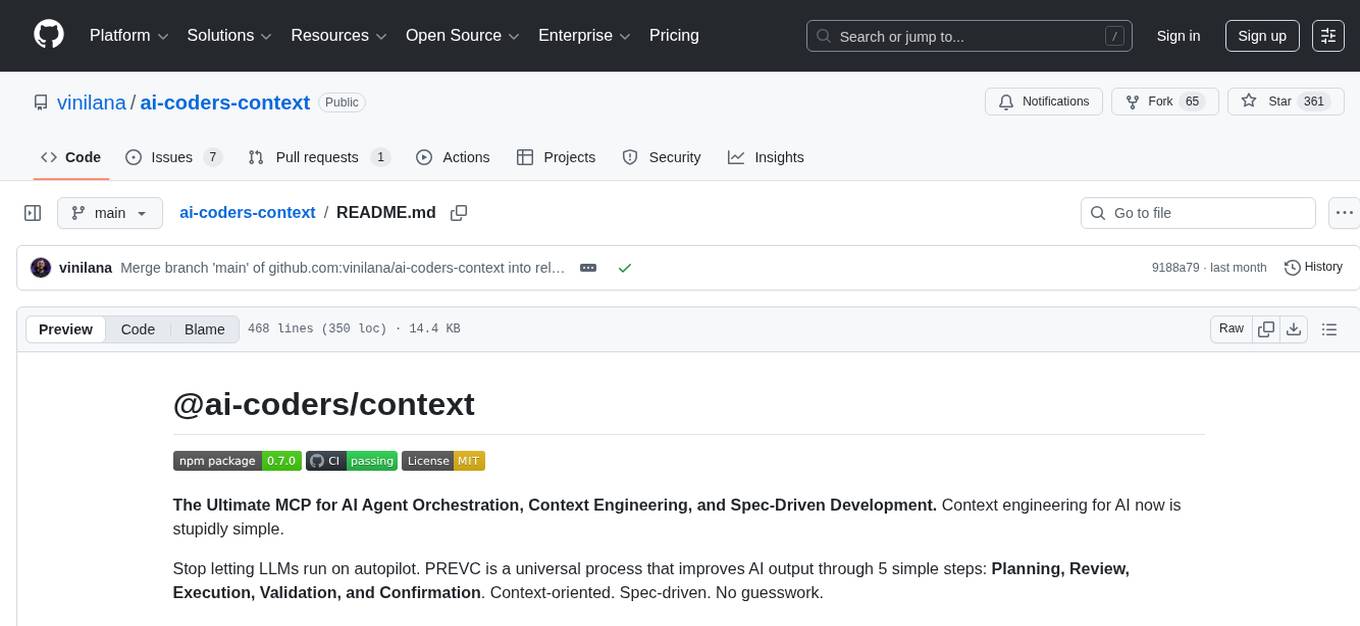
ai-coders-context
The @ai-coders/context repository provides the Ultimate MCP for AI Agent Orchestration, Context Engineering, and Spec-Driven Development. It simplifies context engineering for AI by offering a universal process called PREVC, which consists of Planning, Review, Execution, Validation, and Confirmation steps. The tool aims to address the problem of context fragmentation by introducing a single `.context/` directory that works universally across different tools. It enables users to create structured documentation, generate agent playbooks, manage workflows, provide on-demand expertise, and sync across various AI tools. The tool follows a structured, spec-driven development approach to improve AI output quality and ensure reproducible results across projects.
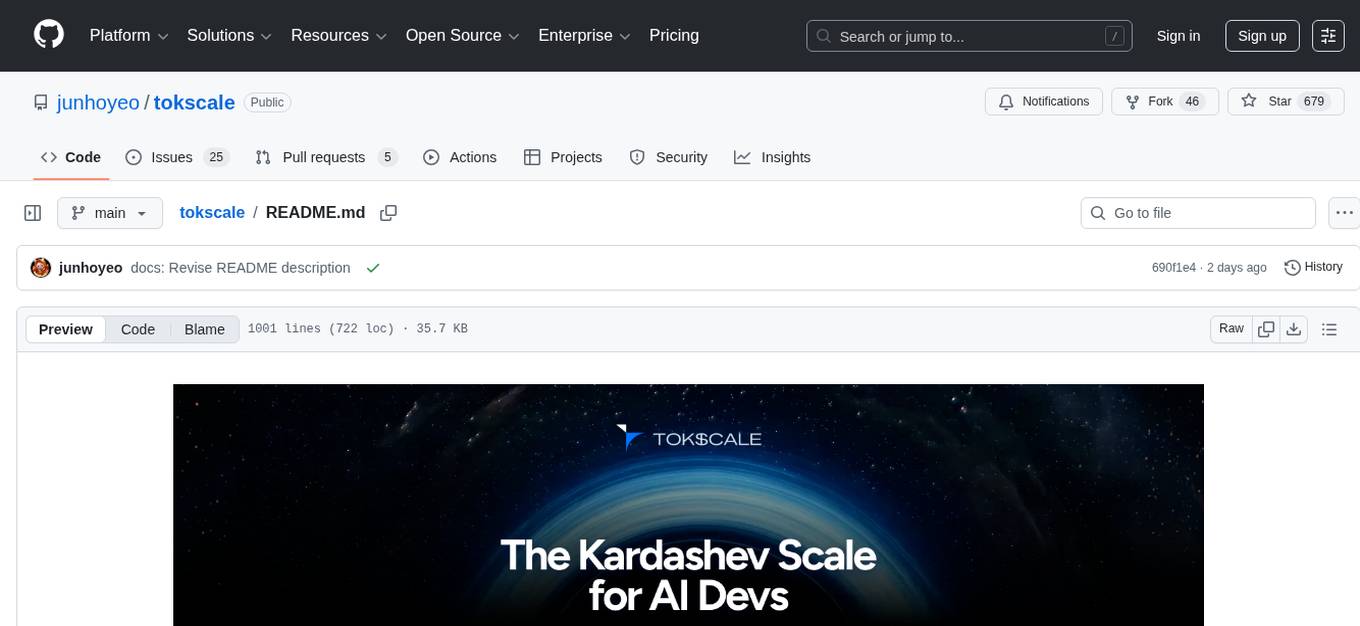
tokscale
Tokscale is a high-performance CLI tool and visualization dashboard for tracking token usage and costs across multiple AI coding agents. It helps monitor and analyze token consumption from various AI coding tools, providing real-time pricing calculations using LiteLLM's pricing data. Inspired by the Kardashev scale, Tokscale measures token consumption as users scale the ranks of AI-augmented development. It offers interactive TUI mode, multi-platform support, real-time pricing, detailed breakdowns, web visualization, flexible filtering, and social platform features.
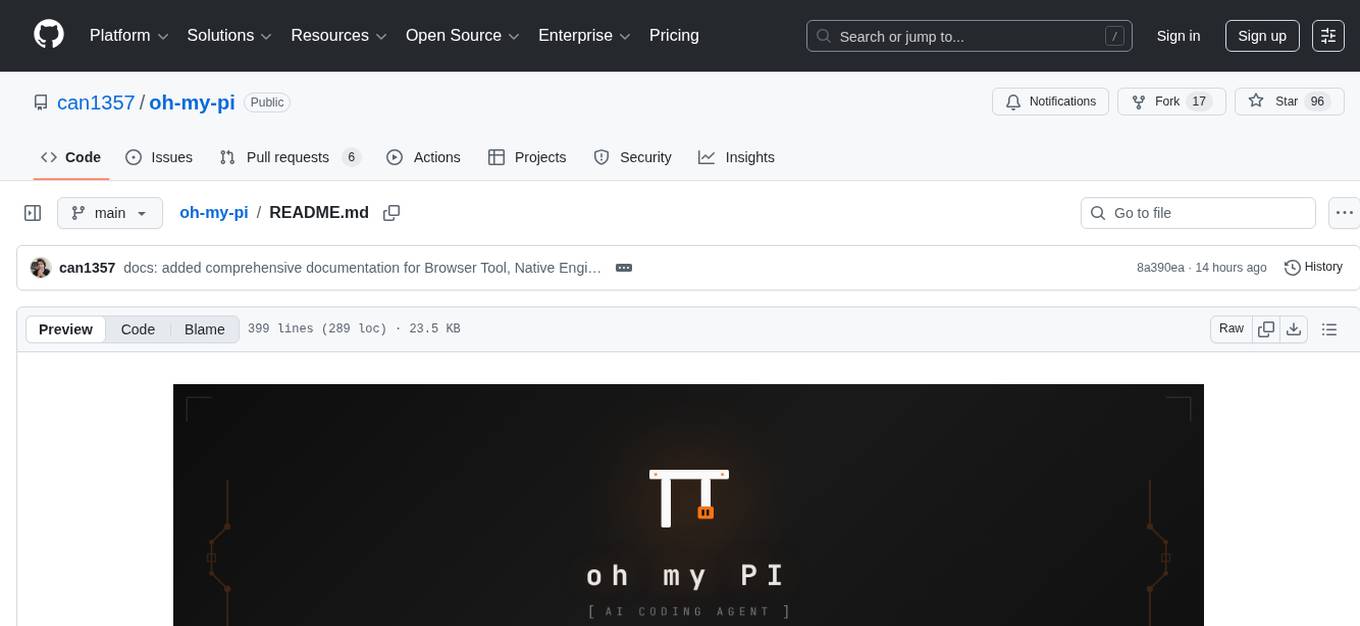
oh-my-pi
oh-my-pi is an AI coding agent for the terminal, providing tools for interactive coding, AI-powered git commits, Python code execution, LSP integration, time-traveling streamed rules, interactive code review, task management, interactive questioning, custom TypeScript slash commands, universal config discovery, MCP & plugin system, web search & fetch, SSH tool, Cursor provider integration, multi-credential support, image generation, TUI overhaul, edit fuzzy matching, and more. It offers a modern terminal interface with smart session management, supports multiple AI providers, and includes various tools for coding, task management, code review, and interactive questioning.
ck
ck (seek) is a semantic grep tool that finds code by meaning, not just keywords. It replaces traditional grep by understanding the user's search intent. It allows users to search for code based on concepts like 'error handling' and retrieves relevant code even if the exact keywords are not present. ck offers semantic search, drop-in grep compatibility, hybrid search combining keyword precision with semantic understanding, agent-friendly output in JSONL format, smart file filtering, and various advanced features. It supports multiple search modes, relevance scoring, top-K results, and smart exclusions. Users can index projects for semantic search, choose embedding models, and search specific files or directories. The tool is designed to improve code search efficiency and accuracy for developers and AI agents.
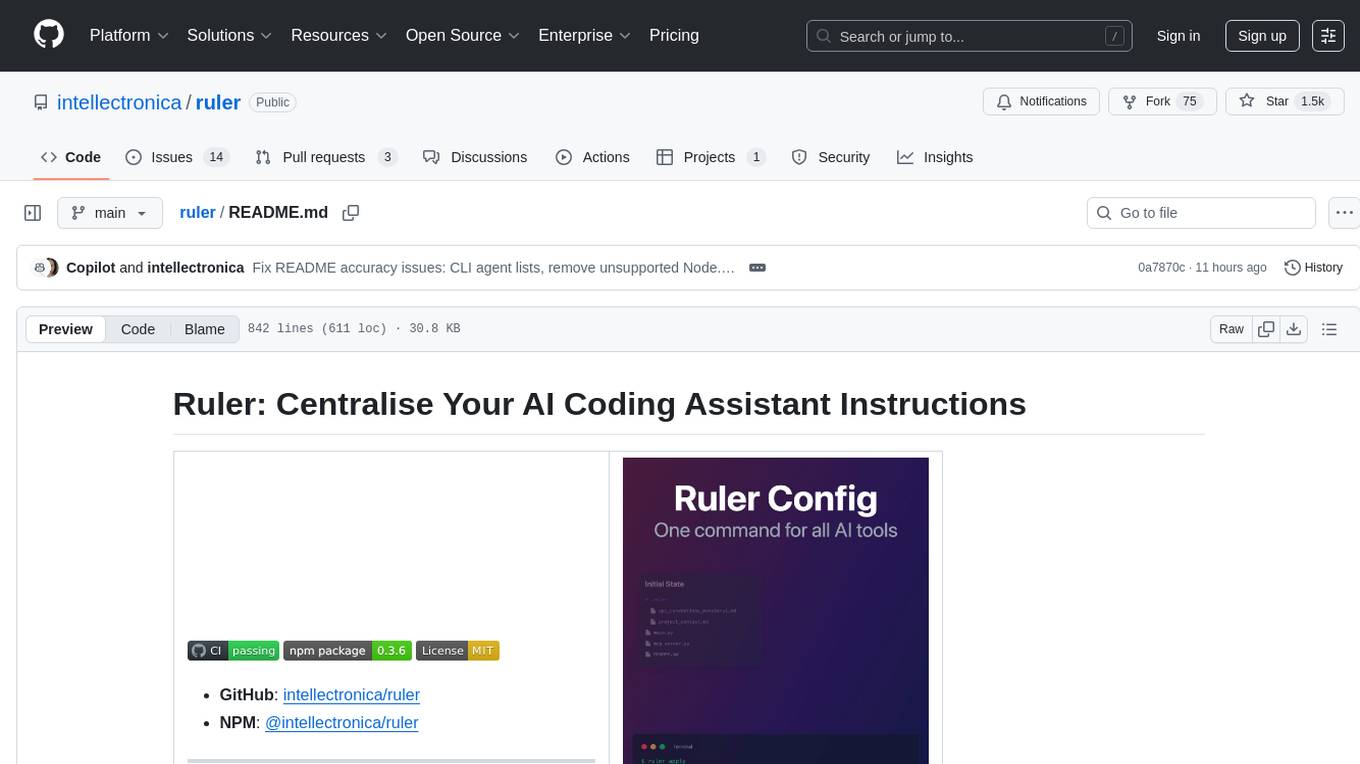
ruler
Ruler is a tool designed to centralize AI coding assistant instructions, providing a single source of truth for managing instructions across multiple AI coding tools. It helps in avoiding inconsistent guidance, duplicated effort, context drift, onboarding friction, and complex project structures by automatically distributing instructions to the right configuration files. With support for nested rule loading, Ruler can handle complex project structures with context-specific instructions for different components. It offers features like centralised rule management, nested rule loading, automatic distribution, targeted agent configuration, MCP server propagation, .gitignore automation, and a simple CLI for easy configuration management.
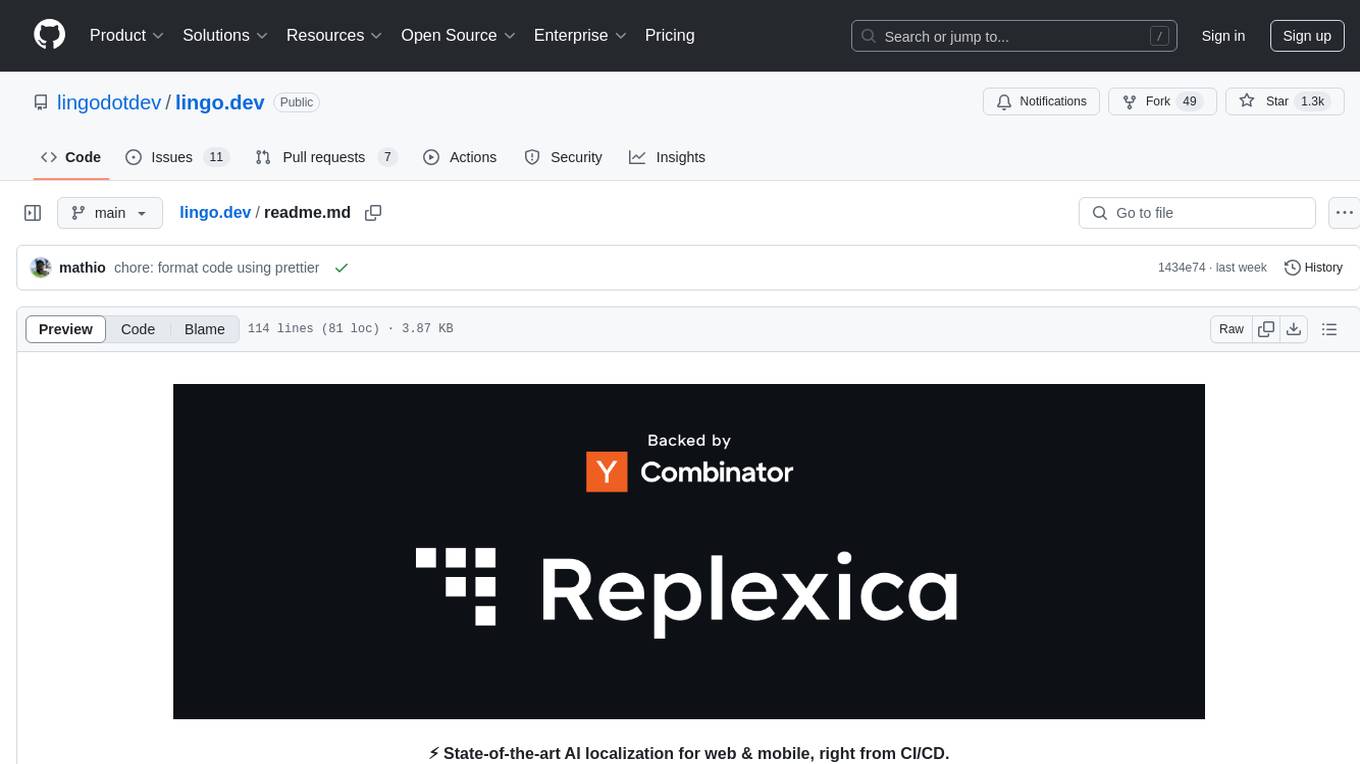
lingo.dev
Replexica AI automates software localization end-to-end, producing authentic translations instantly across 60+ languages. Teams can do localization 100x faster with state-of-the-art quality, reaching more paying customers worldwide. The tool offers a GitHub Action for CI/CD automation and supports various formats like JSON, YAML, CSV, and Markdown. With lightning-fast AI localization, auto-updates, native quality translations, developer-friendly CLI, and scalability for startups and enterprise teams, Replexica is a top choice for efficient and effective software localization.
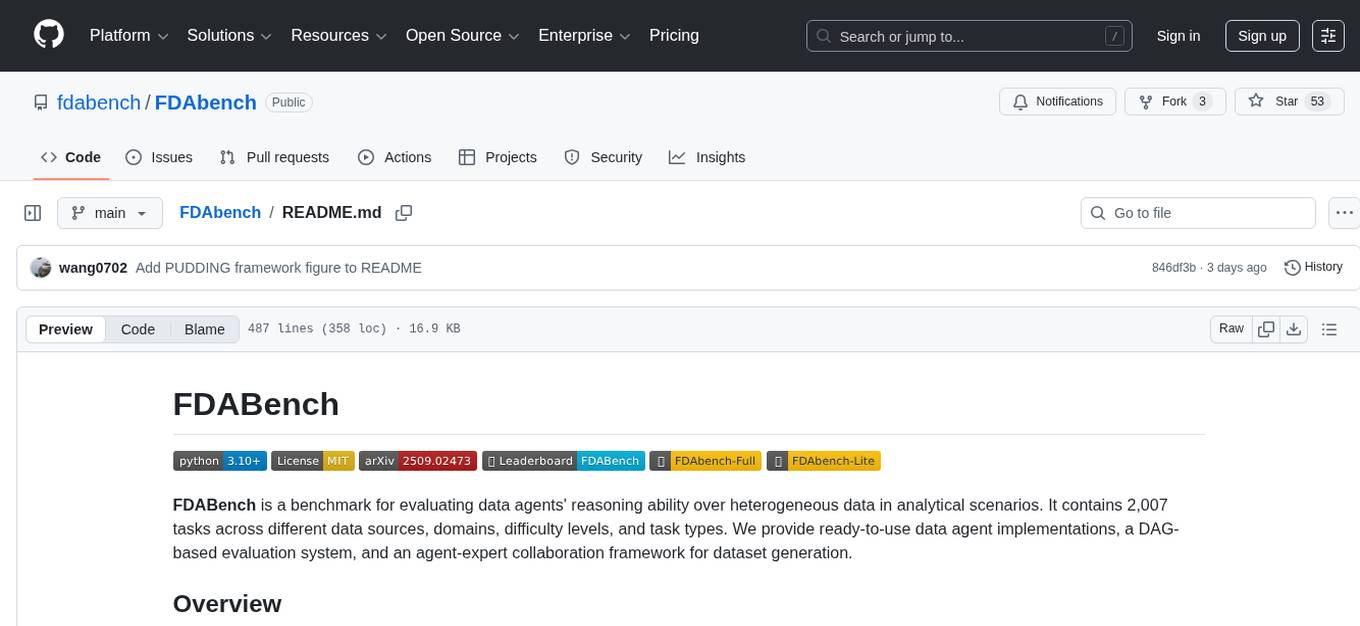
FDAbench
FDABench is a benchmark tool designed for evaluating data agents' reasoning ability over heterogeneous data in analytical scenarios. It offers 2,007 tasks across various data sources, domains, difficulty levels, and task types. The tool provides ready-to-use data agent implementations, a DAG-based evaluation system, and a framework for agent-expert collaboration in dataset generation. Key features include data agent implementations, comprehensive evaluation metrics, multi-database support, different task types, extensible framework for custom agent integration, and cost tracking. Users can set up the environment using Python 3.10+ on Linux, macOS, or Windows. FDABench can be installed with a one-command setup or manually. The tool supports API configuration for LLM access and offers quick start guides for database download, dataset loading, and running examples. It also includes features like dataset generation using the PUDDING framework, custom agent integration, evaluation metrics like accuracy and rubric score, and a directory structure for easy navigation.
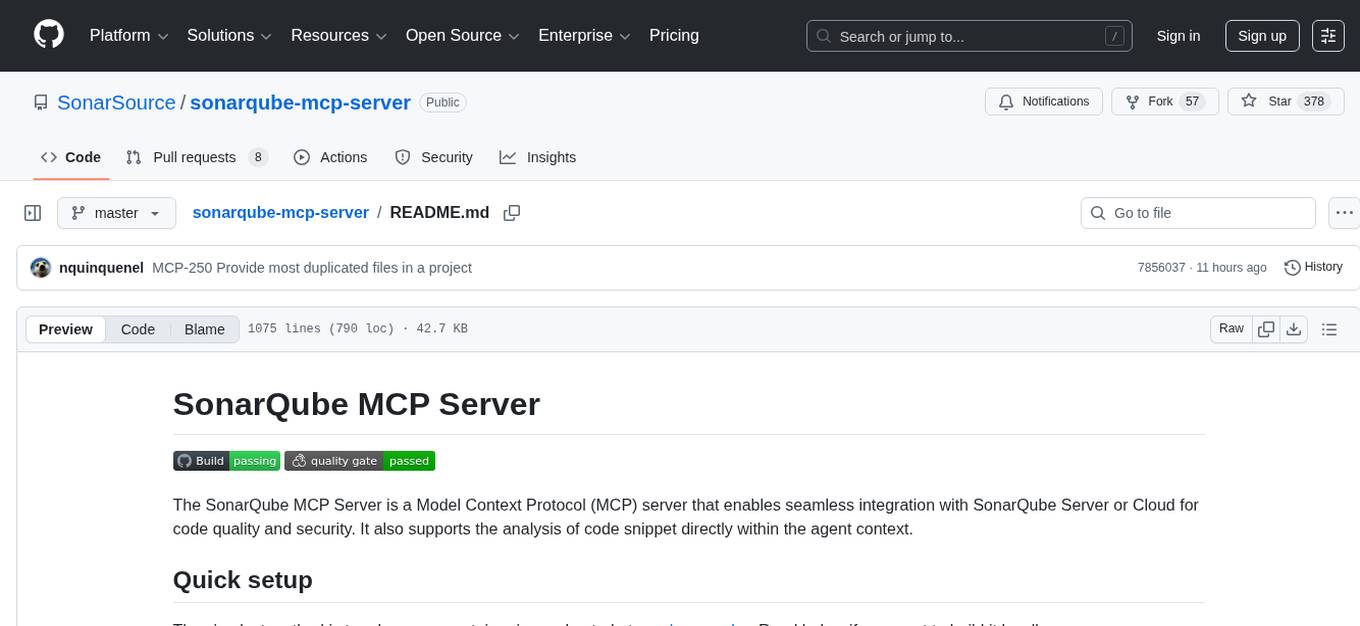
sonarqube-mcp-server
The SonarQube MCP Server is a Model Context Protocol (MCP) server that enables seamless integration with SonarQube Server or Cloud for code quality and security. It supports the analysis of code snippets directly within the agent context. The server provides various tools for analyzing code, managing issues, accessing metrics, and interacting with SonarQube projects. It also supports advanced features like dependency risk analysis, enterprise portfolio management, and system health checks. The server can be configured for different transport modes, proxy settings, and custom certificates. Telemetry data collection can be disabled if needed.
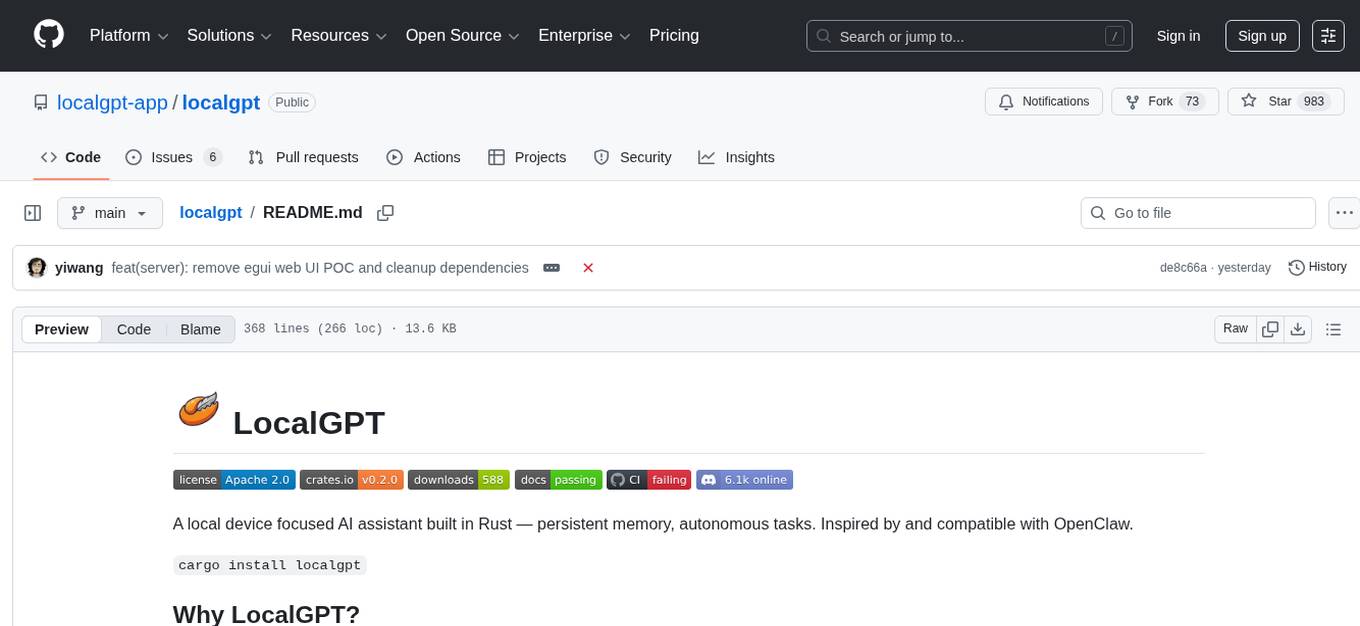
localgpt
LocalGPT is a local device focused AI assistant built in Rust, providing persistent memory and autonomous tasks. It runs entirely on your machine, ensuring your memory data stays private. The tool offers a markdown-based knowledge store with full-text and semantic search capabilities, hybrid web search, and multiple interfaces including CLI, web UI, desktop GUI, and Telegram bot. It supports multiple LLM providers, is OpenClaw compatible, and offers defense-in-depth security features such as signed policy files, kernel-enforced sandbox, and prompt injection defenses. Users can configure web search providers, use OAuth subscription plans, and access the tool from Telegram for chat, tool use, and memory support.
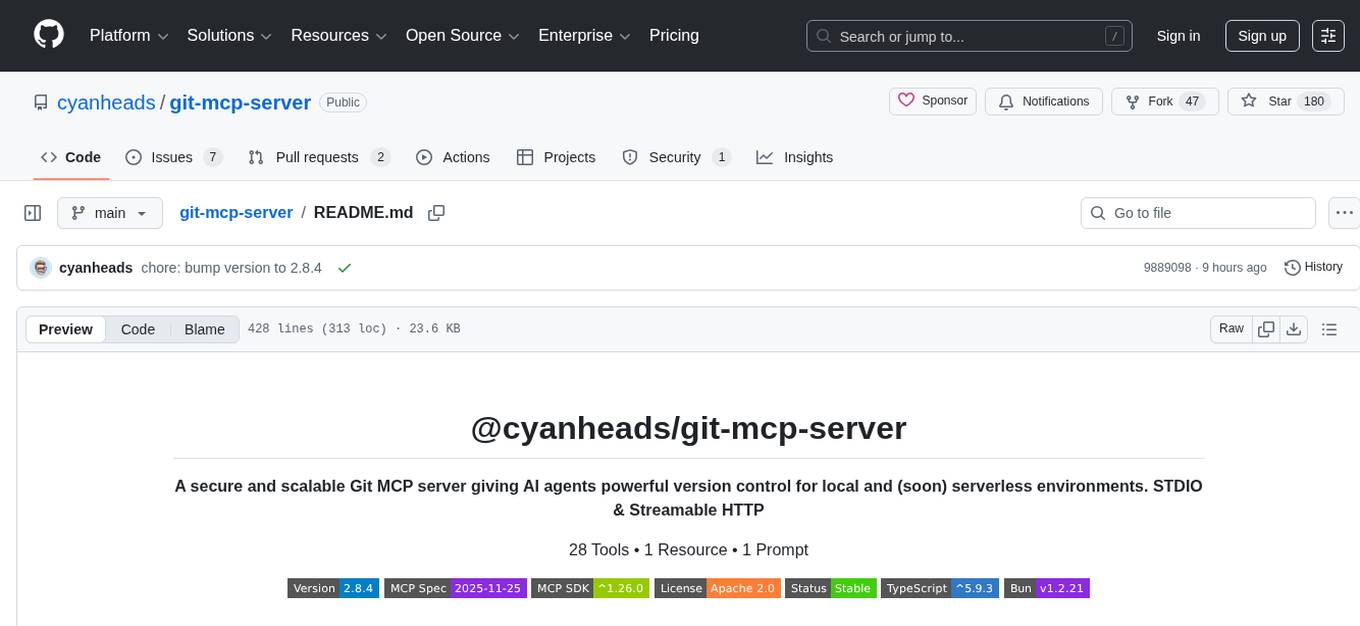
git-mcp-server
A secure and scalable Git MCP server providing AI agents with powerful version control capabilities for local and serverless environments. It offers 28 comprehensive Git operations organized into seven functional categories, resources for contextual information about the Git environment, and structured prompt templates for guiding AI agents through complex workflows. The server features declarative tools, robust error handling, pluggable authentication, abstracted storage, full-stack observability, dependency injection, and edge-ready architecture. It also includes specialized features for Git integration such as cross-runtime compatibility, provider-based architecture, optimized Git execution, working directory management, configurable Git identity, safety features, and commit signing.
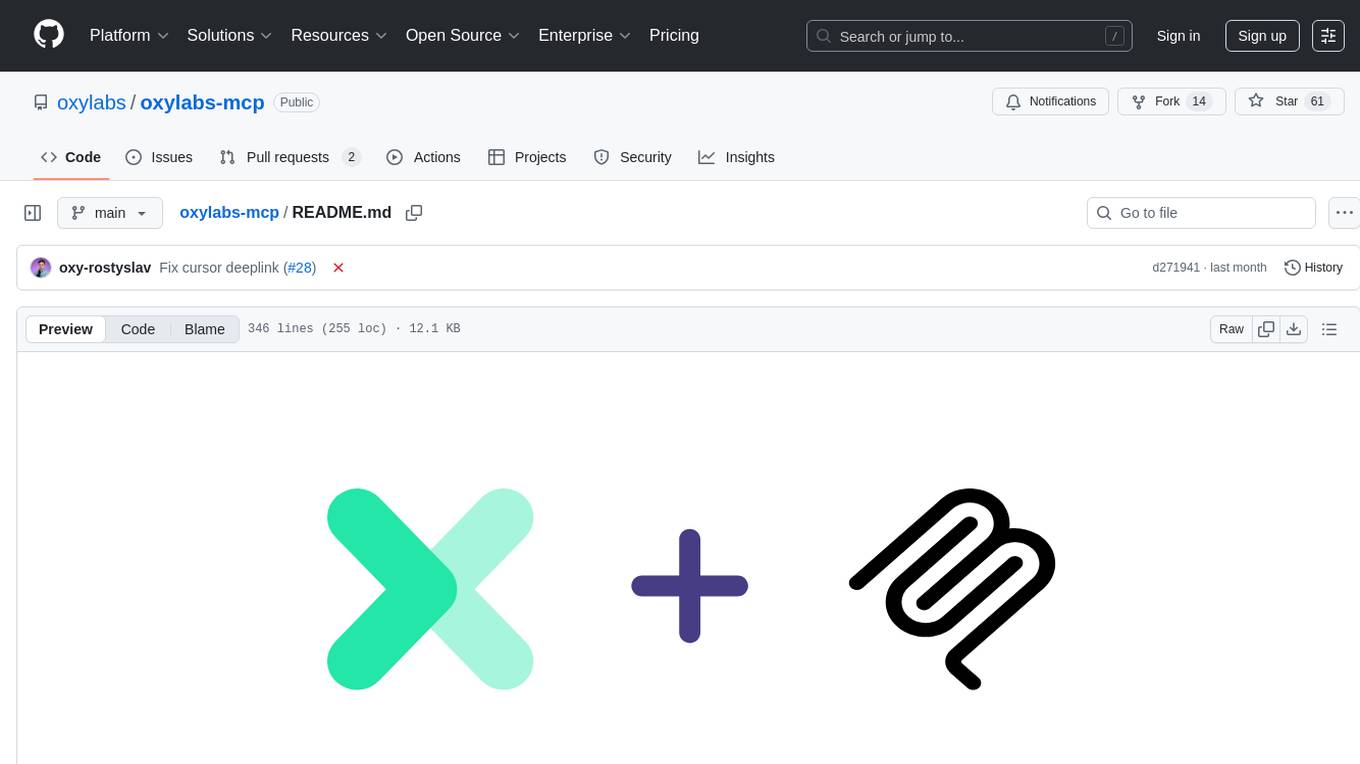
oxylabs-mcp
The Oxylabs MCP Server acts as a bridge between AI models and the web, providing clean, structured data from any site. It enables scraping of URLs, rendering JavaScript-heavy pages, content extraction for AI use, bypassing anti-scraping measures, and accessing geo-restricted web data from 195+ countries. The implementation utilizes the Model Context Protocol (MCP) to facilitate secure interactions between AI assistants and web content. Key features include scraping content from any site, automatic data cleaning and conversion, bypassing blocks and geo-restrictions, flexible setup with cross-platform support, and built-in error handling and request management.
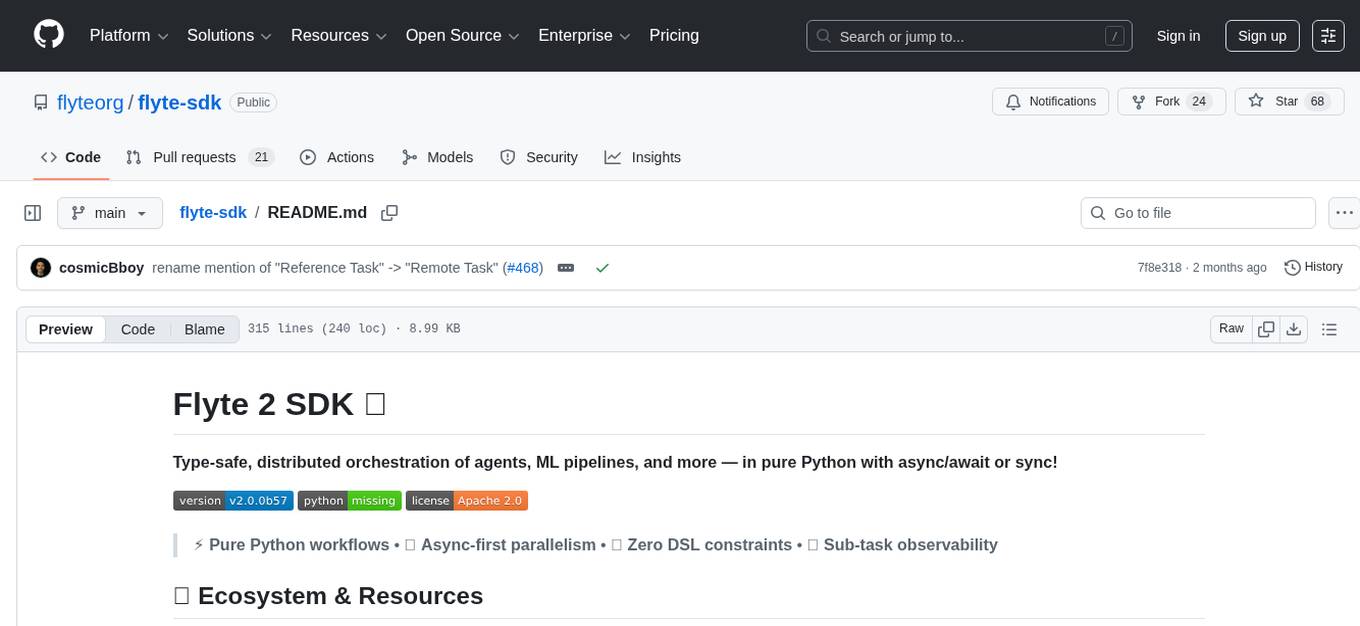
flyte-sdk
Flyte 2 SDK is a pure Python tool for type-safe, distributed orchestration of agents, ML pipelines, and more. It allows users to write data pipelines, ML training jobs, and distributed compute in Python without any DSL constraints. With features like async-first parallelism and fine-grained observability, Flyte 2 offers a seamless workflow experience. Users can leverage core concepts like TaskEnvironments for container configuration, pure Python workflows for flexibility, and async parallelism for distributed execution. Advanced features include sub-task observability with tracing and remote task execution. The tool also provides native Jupyter integration for running and monitoring workflows directly from notebooks. Configuration and deployment are made easy with configuration files and commands for deploying and running workflows. Flyte 2 is licensed under the Apache 2.0 License.
For similar tasks

probe
Probe is an AI-friendly, fully local, semantic code search tool designed to power the next generation of AI coding assistants. It combines the speed of ripgrep with the code-aware parsing of tree-sitter to deliver precise results with complete code blocks, making it perfect for large codebases and AI-driven development workflows. Probe supports various features like AI-friendly code extraction, fully local operation without external APIs, fast scanning of large codebases, accurate code structure parsing, re-rankers and NLP methods for better search results, multi-language support, interactive AI chat mode, and flexibility to run as a CLI tool, MCP server, or interactive AI chat.
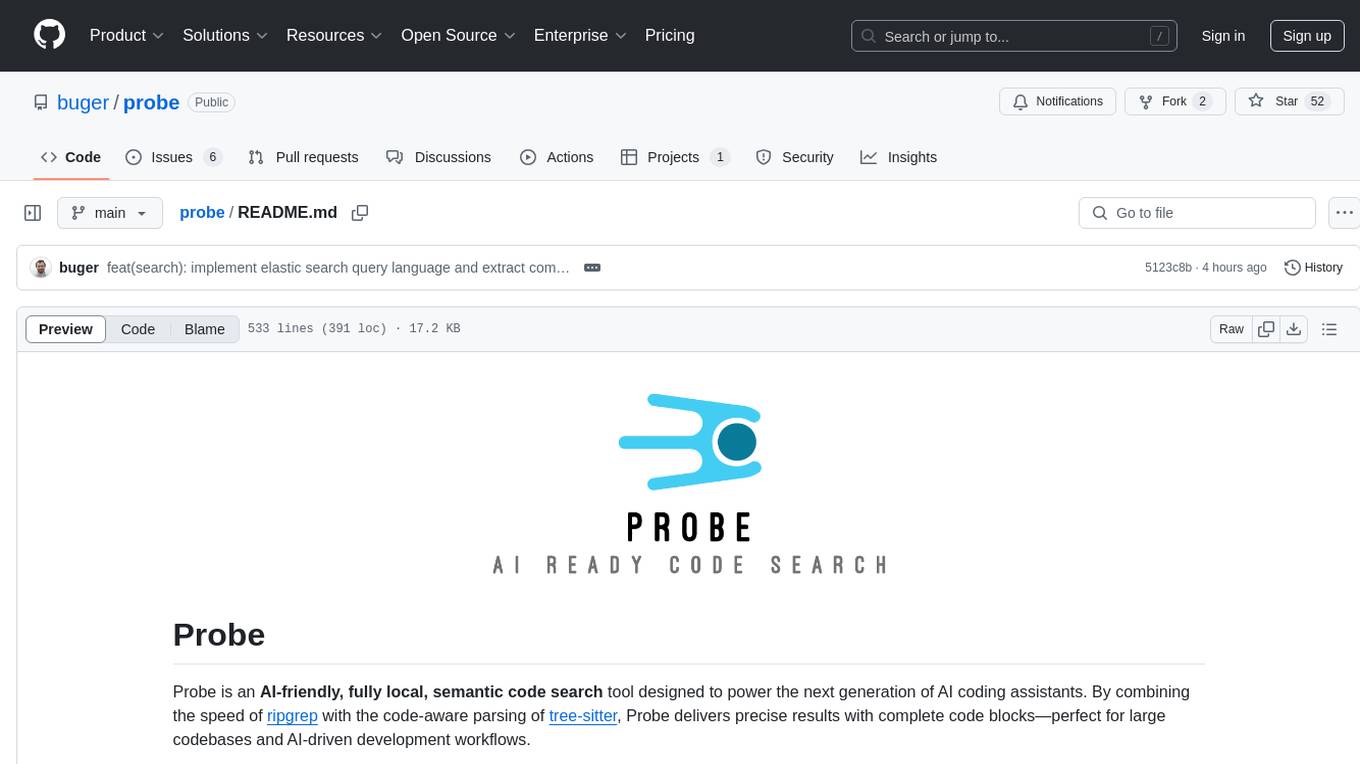
probe
Probe is an AI-friendly, fully local, semantic code search tool designed to power the next generation of AI coding assistants. It combines the speed of ripgrep with the code-aware parsing of tree-sitter to deliver precise results with complete code blocks, making it perfect for large codebases and AI-driven development workflows. Probe is fully local, keeping code on the user's machine without relying on external APIs. It supports multiple languages, offers various search options, and can be used in CLI mode, MCP server mode, AI chat mode, and web interface. The tool is designed to be flexible, fast, and accurate, providing developers and AI models with full context and relevant code blocks for efficient code exploration and understanding.
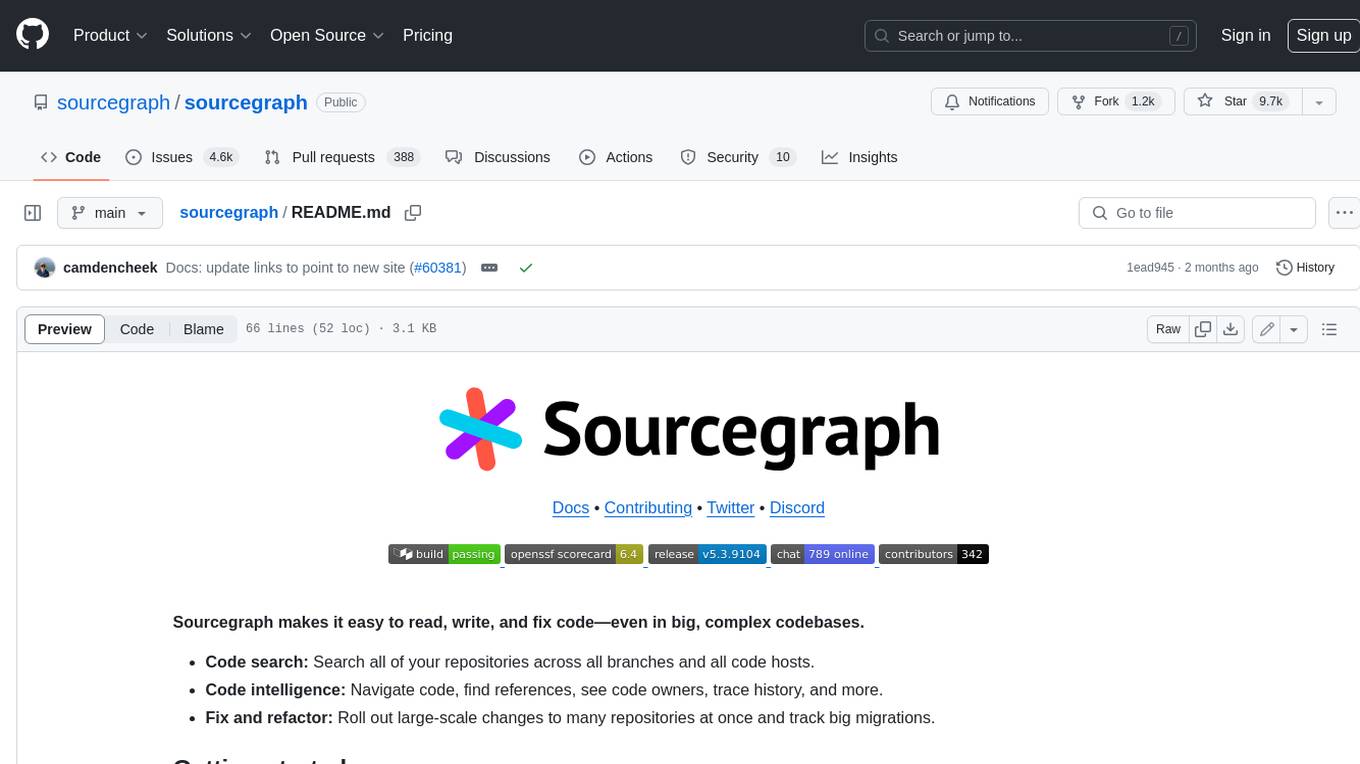
sourcegraph
Sourcegraph is a code search and navigation tool that helps developers read, write, and fix code in large, complex codebases. It provides features such as code search across all repositories and branches, code intelligence for navigation and refactoring, and the ability to fix and refactor code across multiple repositories at once.
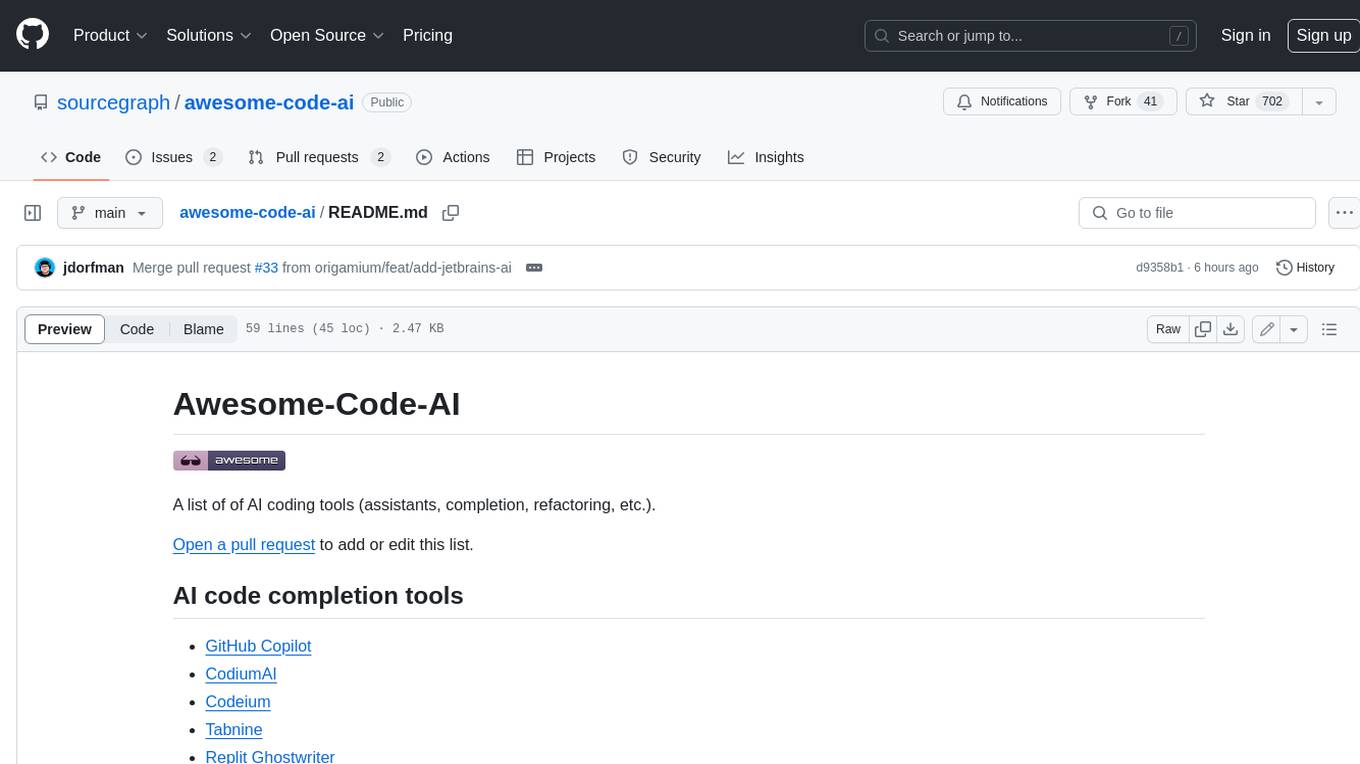
awesome-code-ai
A curated list of AI coding tools, including code completion, refactoring, and assistants. This list includes both open-source and commercial tools, as well as tools that are still in development. Some of the most popular AI coding tools include GitHub Copilot, CodiumAI, Codeium, Tabnine, and Replit Ghostwriter.
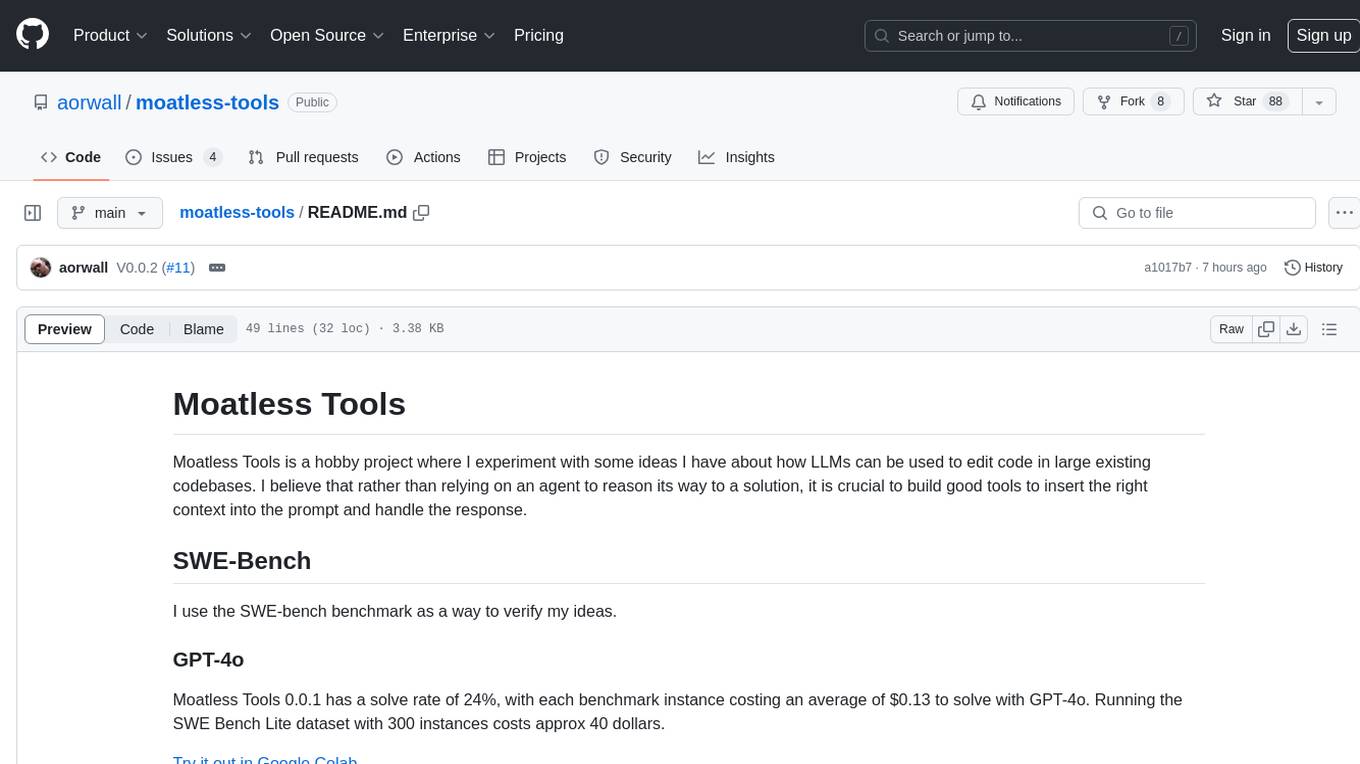
moatless-tools
Moatless Tools is a hobby project focused on experimenting with using Large Language Models (LLMs) to edit code in large existing codebases. The project aims to build tools that insert the right context into prompts and handle responses effectively. It utilizes an agentic loop functioning as a finite state machine to transition between states like Search, Identify, PlanToCode, ClarifyChange, and EditCode for code editing tasks.
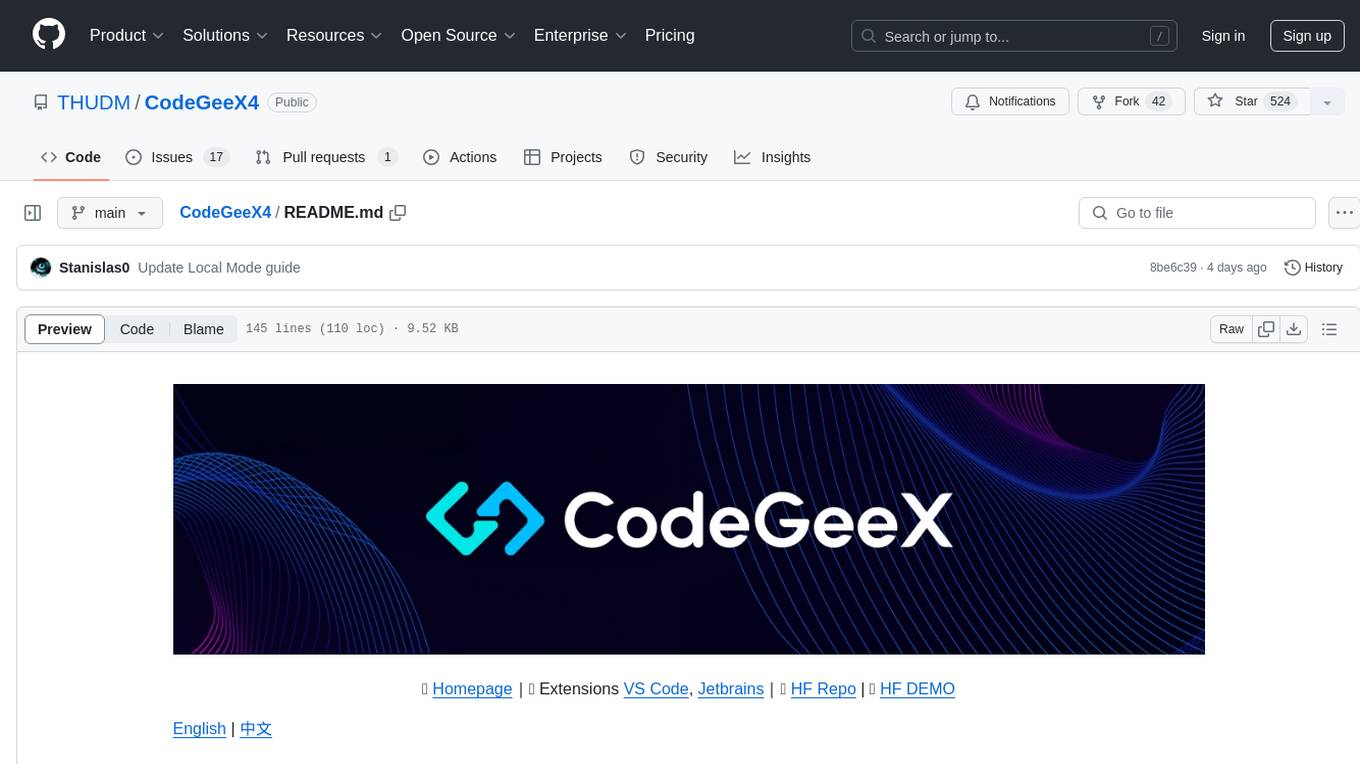
CodeGeeX4
CodeGeeX4-ALL-9B is an open-source multilingual code generation model based on GLM-4-9B, offering enhanced code generation capabilities. It supports functions like code completion, code interpreter, web search, function call, and repository-level code Q&A. The model has competitive performance on benchmarks like BigCodeBench and NaturalCodeBench, outperforming larger models in terms of speed and performance.
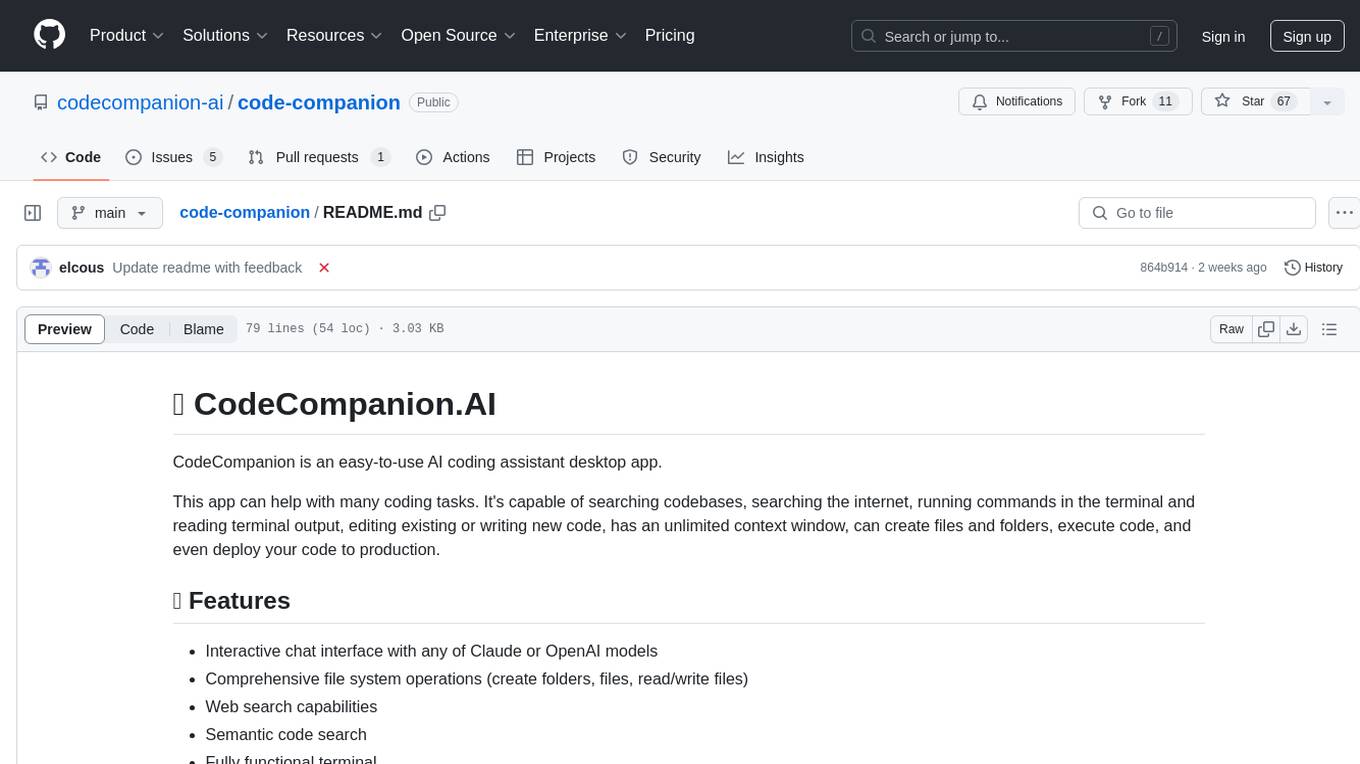
code-companion
CodeCompanion.AI is an AI coding assistant desktop app that helps with various coding tasks. It features an interactive chat interface, file system operations, web search capabilities, semantic code search, a fully functional terminal, code preview and approval, unlimited context window, dynamic context management, and more. Users can save chat conversations and set custom instructions per project.
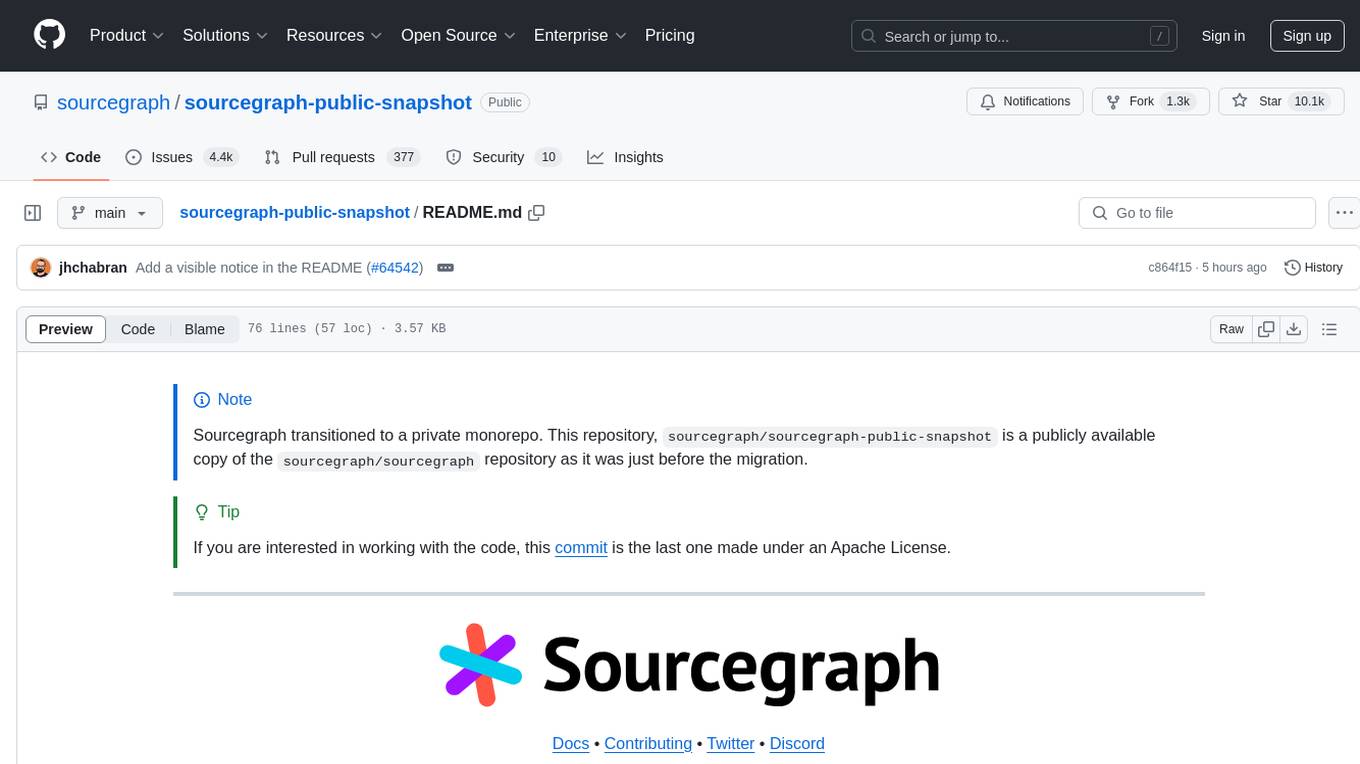
sourcegraph-public-snapshot
Sourcegraph is a tool that simplifies reading, writing, and fixing code in large and complex codebases. It offers features such as code search across repositories, code intelligence for code navigation and history tracing, and the ability to roll out large-scale changes to multiple repositories simultaneously. Sourcegraph can be used on the cloud or self-hosted, and provides public code search on Sourcegraph.com. The tool is designed to enhance code understanding and collaboration within development teams.
For similar jobs

sweep
Sweep is an AI junior developer that turns bugs and feature requests into code changes. It automatically handles developer experience improvements like adding type hints and improving test coverage.

teams-ai
The Teams AI Library is a software development kit (SDK) that helps developers create bots that can interact with Teams and Microsoft 365 applications. It is built on top of the Bot Framework SDK and simplifies the process of developing bots that interact with Teams' artificial intelligence capabilities. The SDK is available for JavaScript/TypeScript, .NET, and Python.

ai-guide
This guide is dedicated to Large Language Models (LLMs) that you can run on your home computer. It assumes your PC is a lower-end, non-gaming setup.

classifai
Supercharge WordPress Content Workflows and Engagement with Artificial Intelligence. Tap into leading cloud-based services like OpenAI, Microsoft Azure AI, Google Gemini and IBM Watson to augment your WordPress-powered websites. Publish content faster while improving SEO performance and increasing audience engagement. ClassifAI integrates Artificial Intelligence and Machine Learning technologies to lighten your workload and eliminate tedious tasks, giving you more time to create original content that matters.

chatbot-ui
Chatbot UI is an open-source AI chat app that allows users to create and deploy their own AI chatbots. It is easy to use and can be customized to fit any need. Chatbot UI is perfect for businesses, developers, and anyone who wants to create a chatbot.

BricksLLM
BricksLLM is a cloud native AI gateway written in Go. Currently, it provides native support for OpenAI, Anthropic, Azure OpenAI and vLLM. BricksLLM aims to provide enterprise level infrastructure that can power any LLM production use cases. Here are some use cases for BricksLLM: * Set LLM usage limits for users on different pricing tiers * Track LLM usage on a per user and per organization basis * Block or redact requests containing PIIs * Improve LLM reliability with failovers, retries and caching * Distribute API keys with rate limits and cost limits for internal development/production use cases * Distribute API keys with rate limits and cost limits for students

uAgents
uAgents is a Python library developed by Fetch.ai that allows for the creation of autonomous AI agents. These agents can perform various tasks on a schedule or take action on various events. uAgents are easy to create and manage, and they are connected to a fast-growing network of other uAgents. They are also secure, with cryptographically secured messages and wallets.

griptape
Griptape is a modular Python framework for building AI-powered applications that securely connect to your enterprise data and APIs. It offers developers the ability to maintain control and flexibility at every step. Griptape's core components include Structures (Agents, Pipelines, and Workflows), Tasks, Tools, Memory (Conversation Memory, Task Memory, and Meta Memory), Drivers (Prompt and Embedding Drivers, Vector Store Drivers, Image Generation Drivers, Image Query Drivers, SQL Drivers, Web Scraper Drivers, and Conversation Memory Drivers), Engines (Query Engines, Extraction Engines, Summary Engines, Image Generation Engines, and Image Query Engines), and additional components (Rulesets, Loaders, Artifacts, Chunkers, and Tokenizers). Griptape enables developers to create AI-powered applications with ease and efficiency.
